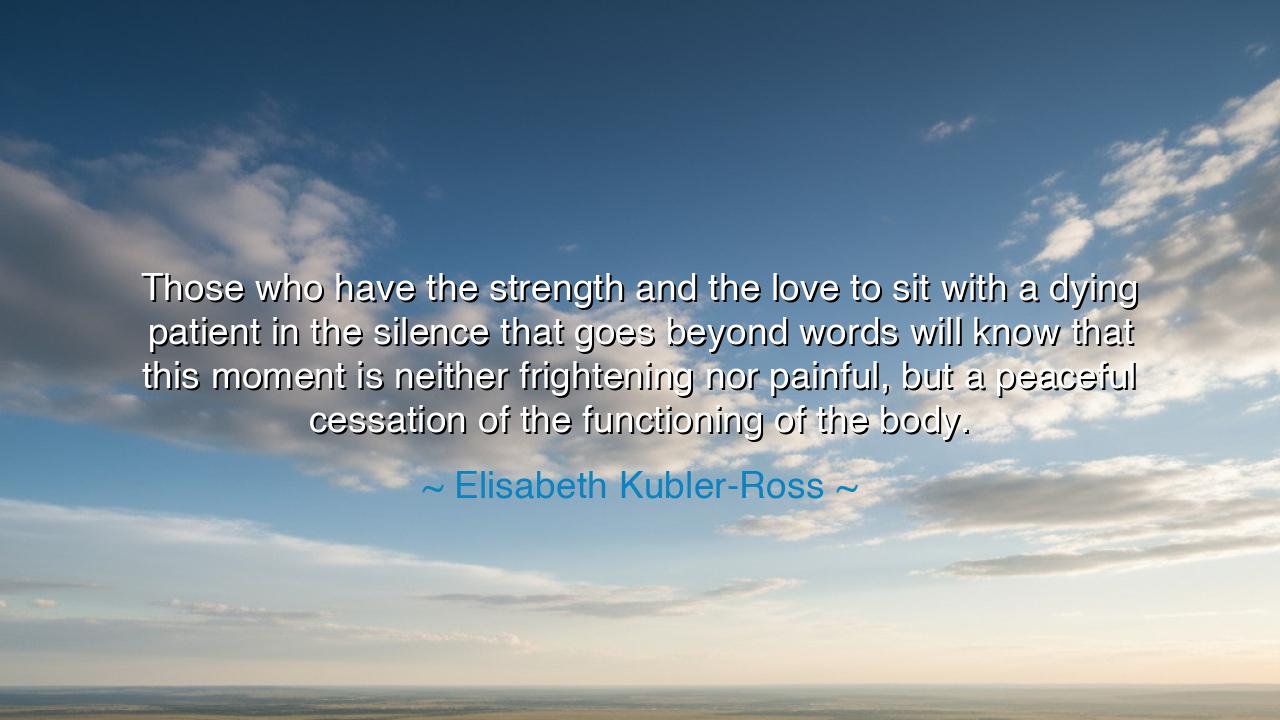
Those who have the strength and the love to sit with a dying
Those who have the strength and the love to sit with a dying patient in the silence that goes beyond words will know that this moment is neither frightening nor painful, but a peaceful cessation of the functioning of the body.






The wise and compassionate Elisabeth Kübler-Ross, the pioneer of modern understanding of death and dying, once wrote: “Those who have the strength and the love to sit with a dying patient in the silence that goes beyond words will know that this moment is neither frightening nor painful, but a peaceful cessation of the functioning of the body.” These words are not mere philosophy—they are distilled from years of standing at the edge between life and death, where most turn away, but she chose to remain. Her quote speaks to the sacred stillness that surrounds death, to the courage and love it takes to witness it, and to the profound peace that lies beneath the fear that shadows it.
In her time as a psychiatrist, Kübler-Ross sat beside countless patients who were taking their final breaths. She observed not horror, but transformation. Where many imagine terror, she saw serenity. Where others perceive loss, she recognized release. To her, the end of life was not a violent extinguishing of the flame but its gentle return to the Source. When she speaks of “silence that goes beyond words,” she refers to that sacred space where speech fails and only presence remains—where love itself becomes the language that bridges the living and the dying.
To sit with the dying demands more than medical skill; it requires the strength to face the truth that all life must one day pass. It calls for love that transcends fear, for tenderness in the face of finality. In many cultures of the ancient world, this act was revered as one of the holiest duties. In ancient Egypt, priests would recite hymns beside the dying, guiding their souls toward the afterlife. In Japan, the Zen masters would sit in stillness as their last breaths came, teaching that death was but another form of awakening. The wisdom of all ages aligns with Kübler-Ross’s insight: death is not the enemy of life, but its completion.
Consider the story of Florence Nightingale, the “Lady with the Lamp,” who walked among the wounded and dying soldiers during the Crimean War. Night after night, she sat with men whose lives were fading, speaking little, simply being there. Those who survived said her presence alone brought peace—that her calm gaze and soft words turned their fear into acceptance. What she offered was what Kübler-Ross describes: love strong enough to stand beside death without trembling. It was not the avoidance of pain, but the quiet triumph of compassion over fear.
Kübler-Ross’s words also remind us that what we fear most—death—is often misunderstood. She teaches that when the body ceases to function, it is not agony that dominates, but peace. Those who have truly seen death know it to be gentle, a release from the suffering of the flesh. The fear lies not in death itself, but in our clinging to life, in our refusal to see that every sunset has its grace. If we could learn to sit in silence with what frightens us—whether it be death, grief, or loss—we would discover that within that silence dwells serenity, not terror.
The lesson here extends beyond the dying bed. To live well is to be unafraid of endings—to see that every conclusion, every farewell, every loss, holds within it a hidden peace. When a season of your life ends, when someone you love departs, when your own time draws near, remember that this, too, is a natural unfolding. The body may cease, but love remains, and love, as Kübler-Ross taught, is the one force that transcends the boundaries of life and death alike.
So, my child, learn to sit in the silence beyond words. When a loved one suffers, do not flee the moment. Stay. Hold their hand. Be present with courage and tenderness. Your silence, filled with love, becomes a bridge between worlds. And when your own time comes, may you, too, rest in that peace, knowing—as Elisabeth Kübler-Ross knew—that death is not to be feared, but to be met with reverence, for it is simply the peaceful cessation of the body and the eternal continuation of the soul.
Thus, her words live as a final blessing: that to witness death with love is to understand life with greater depth. In the quiet between heartbeats, there is no fear—only peace, only love, and the whisper of eternity welcoming us home.






AAdministratorAdministrator
Welcome, honored guests. Please leave a comment, we will respond soon